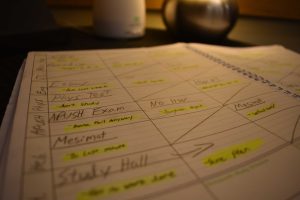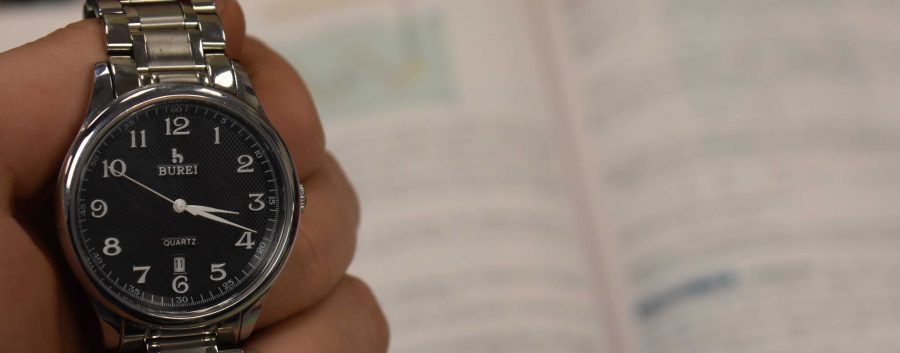Slider image by Austin Klinock.
Youtube, Netflix, Snapchat, Instagram. What do all of these things have in common? Answer: They are what you should not be doing at 11:32 p.m. when you have a paper due the following day. Procrastination is a scourge that has plagued students throughout history, but in the modern age of technology, a million different distractions are now available at the touch of a button, making it that much easier to dawdle one’s time away. So how can you avoid falling victim to the temptation of procrastination?
People procrastinate for a number of different reasons. Some are perfectionists who get overwhelmed attempting to create a flawless product, and eventually end up not getting anything done at all. Others are hesitant due to their awareness of the assignment’s difficulty, and thus procrastinate to avoid the daunting task. And sometimes, you just flat-out don’t feel like working.

Students at Hyman Brand Hebrew Academy (HBHA) are more than familiar with the grind of less than desirable work. It is not uncommon to want to push off taking notes for the White Rose Essay, learning a Torah reading, doing Meltz’s monthly mesimot, or writing an article for publications in favor of just doing it later. It becomes especially difficult to stay on top of your work when you have assignments with far off due dates, which can prove to be the ultimate source of anxiety.
As Avi Brudoley, a senior at HBHA, stated: “There is a very small difference between the most comforting and the most stressful thing for a student to hear. All it takes is two letters and an apostrophe to turn ‘Have you done that yet?’ into ‘You haven’t done that yet?’” If both are answered with “no,” being asked the former question serves as a sign that someone else has yet to finish the assignment, thus validating your current level of progress. The latter, on the other hand, serves as a metaphorical kick in the teeth, as you come to the conclusion that you must be pretty far behind for them to be astonished by your lack of progress. While this play on words is quite humorous, it brings up the most prominent and most dangerous aspect of procrastination: falling behind.
The misconception that one can justify procrastination with effective time management can be seen frequently amongst students, and especially high schoolers, who believe that their many years of experience has “trained” them to be able to get away with procrastinating. In Jewish terms, these people are referred to as “mashugana.” It would be nonsensical to believe such a thing, especially given the unpredictable nature of HBHA’s schedule. With a calendar that seems to lose all reliability for more than a week out, it is imperative to leave some wiggle room in case of an impromptu schedule change. As a result, teachers are often unable to plan very far ahead, leaving little more than a vague syllabus at their students’ disposal. That being said, it is dangerous to push off assignments and assume that no unforeseen work will get in the way. Some teachers even go out of their way to dissuade their students from procrastination.
R. Gina Renee, English Department Chair and social studies teacher, sends out a weekly email every Sunday to her AP US History (APUSH) students in which she goes over the agenda for the week to come. In a recent email, Renee addressed her new grading policy regarding notes not turned in on time, and how late submissions will from now on be automatically graded as a 0. At the end of the email, Renee explained her motives to the class. “My goal is to support you to establish awesome study skills for college and rid you off your tendency to succumb to ‘overwhelm’ and procrastination…” Renee stated. She concluded by humorously stating that “you may procrastinate for other classes, but I am making it painful to procrastinate for mine.”
As you may very well have noticed, I have yet to answer the question of how one can avoid procrastinating. I have avoided this question because the answer is quite obvious. Just stay on top of your work and do not get distracted. Everyone knows this cliche, and you certainly do not need me to repeat it to you. Unfortunately, it’s a lot easier said than done. There are always going to be assignments and deadlines, both in and out of school. And while people like Laura Severin, Learning Specialist in Student Services, would be overjoyed to help you prioritize your work by setting up a schedule, you are the one who is ultimately going to have to figure out the method that works best for you.

The secret lies in prioritization, as HBHA Junior, Addi Brand explains: “My priority right now, and this should be the priority for every student, is doing well in school. If I do well in school, then, when I have the chance to enjoy myself and watch TV, it is more enjoyable because I know I’m getting my things done.”
And while it may take time, if you practice good study habits such as prioritizing school work over leisure and effectively managing your time so that you do not get overwhelmed, you will learn to curb the temptation to procrastinate, and discover that, in the end, it’s not as hard as it seems.
(Writing for this article began at 8:42 p.m. on Feb. 3, less than 12 hours before the first draft was due… little sleep was had that night.)















































































